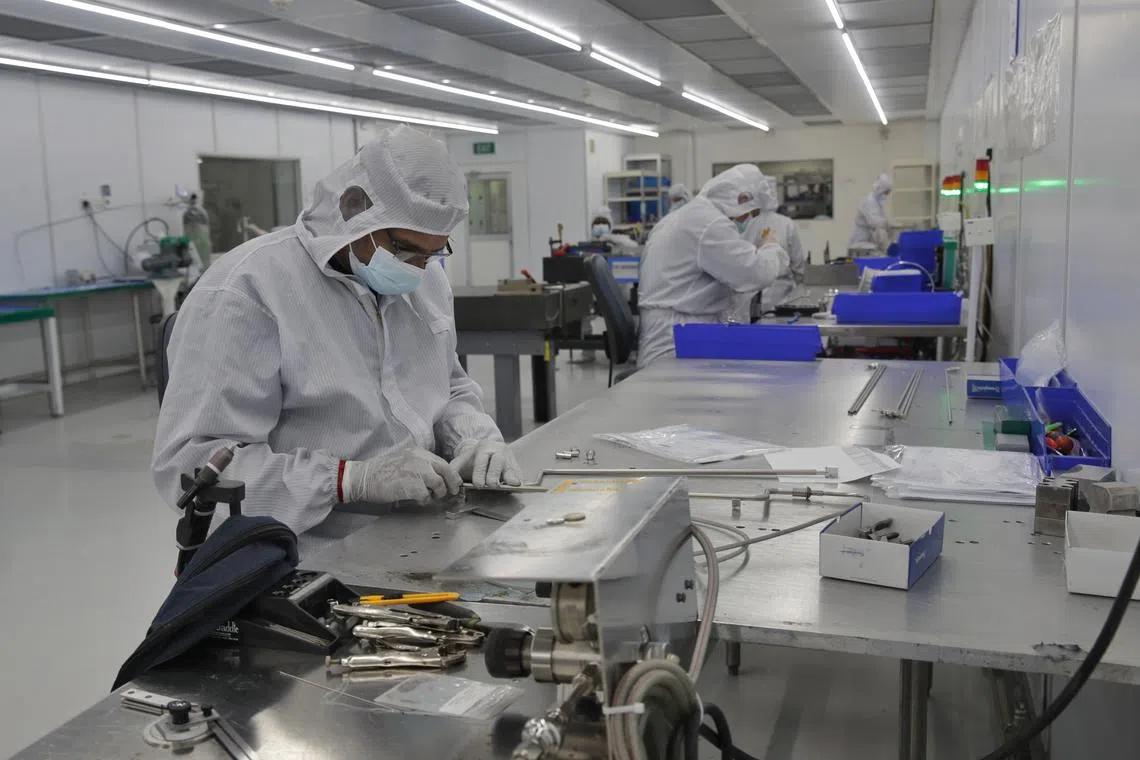National Research Foundation to continue to support economic transformation
Sign up now: Get ST's newsletters delivered to your inbox

The NRF's support will help advance Singapore’s capabilities in strategic technology areas, unlocking new opportunities for growth and good jobs.
PHOTO: ST FILE
Follow topic:
SINGAPORE – Singapore’s efforts in building a thriving research, innovation and enterprise (RIE) sector have borne fruit in many areas. Investments in biomedical sciences and medical technology have seen the sector grow to support more than 25,000 jobs, making up almost 4 per cent of Singapore’s gross domestic product.
Singapore’s start-up ecosystem is continuing to grow, with venture capital funding raised here increasing more than 20 times, from about $500 million in 2011 to about $11 billion in 2022.
These accomplishments were detailed in an addendum released by the National Research Foundation (NRF) under the Prime Minister’s Office on Wednesday, following President Halimah Yacob’s address at the opening of the new session of Parliament earlier in the week.
The NRF, which was set up in 2006, sets the national direction for research and development (R&D) by enacting policies, plans and strategies.
In addition to their economic importance, efforts in the RIE sector have been critical in addressing Singapore’s challenges in areas such as public health and resource resilience, said Deputy Prime Minister Heng Swee Keat, who is chairman of the NRF.
He raised the example of Singapore’s capabilities in biomedical science and infectious diseases that enabled the country to respond to Covid-19 quickly.
The NRF will support the next wave of Singapore’s economic transformation by advancing its capabilities in strategic technology areas, unlocking new opportunities for growth and good jobs.
“For example, in the area of semiconductors, our public research institutes and universities are collaborating with industry through corporate laboratories and joint projects, to work on new materials, designs and manufacturing techniques that can drive the next generation of more efficient and powerful chips,” said Mr Heng.
“These innovations will enable advances in wide-ranging applications such as wearables, communications equipment and vehicles, and expand the base of semiconductor manufacturing activities and jobs in Singapore.”
The NRF will also continue to support the transformation efforts of businesses across industry sectors by creating new and improved solutions that leverage science and technology. It is scaling up platforms that bring together institutes of higher learning, public research institutes and industry, so that technological advancements in areas such as medical diagnostics and additive manufacturing are more quickly commercialised. Companies can also establish corporate laboratories with public research performers to address their industry challenges.
The foundation will also strengthen Singapore’s position as an attractive node for businesses to conduct R&D, building on the growth in the country’s business expenditure on R&D, which has risen from about $1.9 billion in 2000 to about $6.6 billion in 2020.
A robust talent pool is also key, said Mr Heng, adding that the number of public and industry researchers in Singapore more than doubled from 20,000 in 2000 to 46,000 in 2020.
The NRF will continue to build a strong core of local research talent by nurturing young people’s interest in the science, technology, engineering and mathematics fields, and providing diverse pathways for those who wish to take up research careers.
Mr Heng said the NRF will also continue to enhance the porosity of research talent across academia, public research institutes and industry, for instance, by seconding public researchers to local enterprises. It is also working with the industry to enhance research capacity, through initiatives such as the Industrial Postgraduate Programme, which provides opportunities for postgraduate students to undertake industrial R&D projects with companies.
“Our RIE investments have created a strong foundation for Singapore to remain competitive amid rapid technological changes. We must continue to leverage and build Singapore’s science and technology capabilities to meet imminent needs and challenges, capture new economic opportunities, and support our businesses and workforce,” said Mr Heng.


